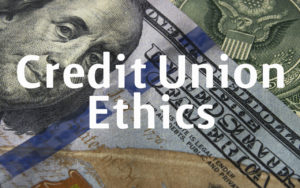Having breakfast with my boss this morning, he shared that his wife woke him with a call that seemed rather urgent. Seems one of their friends, who banked at the same institution they banked at, called to say that their account had a ZERO balance this morning. She asked my boss (her husband) to check their balance to see if things were alright. He did so immediately and all was  well. But apparently not so with their friend. They were hacked and cleaned out over night. Not something you’d like to wake up to. It was apparent that fraud had taken place. Which raises the question about credit union ethics – ethical practices and how safe our accounts really are.
well. But apparently not so with their friend. They were hacked and cleaned out over night. Not something you’d like to wake up to. It was apparent that fraud had taken place. Which raises the question about credit union ethics – ethical practices and how safe our accounts really are.
It’s all those hackers…
Not so fast. Yes there are hackers and phishers and those who would gladly take your identity and money. But what about the inside jobs? Are there those who would bypass credit union ethics and work for their own gain at the expense of customers and/or insurance providers?
Beyond Credit Union Ethics – It’s Fraud!
Stefon D. Clark, 27, an Atlanta man was sentenced to more than 3 years in prison and also ordered by U.S. District Court Judge Steve C. Jones to pay restitution of more than $613,000. Clark pleaded guilty to two counts of bank fraud and one count of conspiracy to commit bank fraud. He ran a social media scheme that deposited more than $1 million in fraudulent checks at the Navy Federal Credit Union, USAA and BB&T.
According to the Atlanta Journal Constitution:
During a scheme lasting at least 17 months, the FBI said, Clark and 2 others posted advertisements on Instagram and other social media sites offering “fast cash” to people who had accounts at the financial institutions.
From some people who answered the ads, the fraudsters were able to obtain bank account numbers, PIN numbers, online banking info and debit cards.
The FBI said the trio then deposited checks that were stolen or from closed accounts into the compromised accounts and withdrew cash from the accounts before the financial institutions realized the checks were bogus.
Question! Who would give information about their banking information to people with ads on Instagram? DUMB!
Time – You Best Friend or Worst Enemy?
In another example of a breach of credit union ethics, Catherine M. Linton, 58, pleaded guilty to stealing $478,285 from Trailblazer Federal Credit Union located in Pennsylvania. She was the manager at the time of the fraud. Her crime lasted for over 17 years. Guess time was (for a time) on her side.
So how did she avoid the auditors reach? Simple she knew when they were coming. According to a report:
“She did not use false or misleading journal entries to conceal the theft from examiners/auditors,” Cessar wrote in court documents. “It was simply a timing issue and she said she was lucky the examiners/auditors never asked her to access the Mid-Atlantic Corporate account.”
The National Credit Union Administration steps in…
Six people convicted of various crimes were banned by the NCUA from participating in the affairs of any federally insured institution. One individual’s actions, a former employee of a Kentucky credit union, led to the institution’s insolvency. A lack of credit union ethics by employees can have far reaching consequences that impact credit union members and the institution.
Debra C. Pyfrom, (former employee of I.B.E.W. Local 816 Federal Credit Union in Paducah, Ky.) pleaded guilty to bank fraud and was sentenced to 78 months in prison, two years’ supervised release and was ordered to pay restitution in the amount of $600,250.
Another former credit union employee of the merged $47 million Boise U.S. Employees Federal Credit Union in Boise, Idaho – Jacqueline Kay Manning, was banned by the NCUA after she pleaded guilty the charge of theft. She was sentenced to four years in prison and ordered to pay restitution in the amount of $213,302.
Teller or Presidents – Credit Union Ethics violations come from anyone
A former Alabama credit union president/CEO was found guilty of 98 felony counts of bank fraud, money laundering, wire fraud and conspiracy.
Jonathan Wade Dunning received a 112-count indictment that detailed how he allegedly controlled Birmingham Financial Federal Credit Union and stole $14 million in property, assets and federal grants that were supposed to fund healthcare services for poor children, adults and the homeless.
Shameless actions and not only a breach of credit union ethics but fraud pure and simple. His crime occurred over a six year period of time.
What were they thinking?
Great question and now, looking back, it is clear that they weren’t. Every choice has a consequence! In the cases above the consequences are significant and life changing. Making one unethical choice, like putting a foot on a slippery slope, can create an experience that one cannot recover from.
Taking ethics seriously is critical. If your organization needs help in becoming more conscious and vigilant in making ethical choices give me a call.
YOUR COMMENTS ARE WELCOME!


